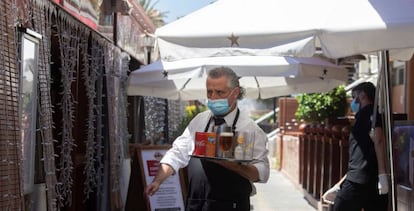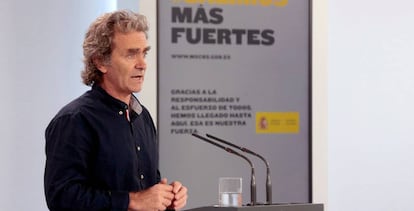Spain records single coronavirus death in 24-hour period
Despite the drop, the Madrid region is preparing for the possibility of new outbreaks as the country scales down confinement measures

After peaking in early April, Covid-19 cases in Spain are down to a trickle. On Thursday, the Health Ministry reported one single death in 24 hours for the second consecutive day. There have been 38 fatalities in the last seven days.
The official death tally is now 27,119, although these figures have been undergoing review following a change in the regional notification system that makes it hard to compare new and old data.
This number also fails to take into account excess deaths recorded at civil registries, many of which are probably coronavirus-related.
According to the latest available numbers, there were 182 new infections in the last 24 hours confirmed through PCR lab tests. Of these, nearly 72% were located in the Madrid region and in Catalonia. The total number of cases is now 237,906.
“We know that the quality of the data is improving every day, that it is coming in faster and increasingly in time to make early decisions and keep cases and outbreaks in check,” said Fernando Simón, director of the health emergency coordination center, about the methodology change.

“We are observing that there are a few areas where there were some cases and there are new ones again, but they are limited to very localized areas and with specific ties among the cases. We have small outbreaks, but they are under control,” he insisted, alluding to new cases recorded in the Catalan province of Lleida as well as in Cuenca, Totana (Murcia) and the exclave city of Ceuta on the northern coast of Africa.
The country is moving through a gradual deescalation plan that is expected to end in late June, if Prime Minister Pedro Sánchez, of the Socialist Party (PSOE), can secure enough congressional support for one final two-week extension to the emergency powers that underpin the lockdown he introduced in mid-March via what is known as a state of alarm.
His minority government has come under fire for allowing large public gatherings in early March, when authorities held that coronavirus cases were under control. In reality, a national epidemic was underway but going undetected because the testing criteria at the time only focused on people who had traveled to risk zones. A Civil Guard report drafted for an investigating judge in Madrid triggered an intense political confrontation in Congress on Wednesday.
Madrid preparing for new outbreak
Madrid, which has become the epicenter of the Covid-19 pandemic in Spain, is preparing to deal with a potential new outbreak, said regional premier Isabel Díaz Ayuso of the Popular Party (PP). The region entered Phase 1 of the national deescalation plan on Monday after its request for a looser lockdown was twice rejected by central authorities.
“We are finalizing the location and construction of a new emergency hospital to replace Ifema,” said Díaz Ayuso, alluding to the city’s convention center, which was turned into a field hospital at the height of the crisis. The Madrid government would like for this new facility to be operational by November. “We have brought in 1,200 tons of material, and have 45 days’ worth of stock in case there should be a new outbreak.”
Since March 8, more than 15,000 people have died of Covid-19 or with similar symptoms in Madrid. Thousands of healthcare professionals became sick after facing the pandemic without enough personal protective equipment and putting in long shifts to deal with more than 70,000 detected cases that overstretched the region’s healthcare system.
English version by Susana Urra.
Tu suscripción se está usando en otro dispositivo
¿Quieres añadir otro usuario a tu suscripción?
Si continúas leyendo en este dispositivo, no se podrá leer en el otro.
FlechaTu suscripción se está usando en otro dispositivo y solo puedes acceder a EL PAÍS desde un dispositivo a la vez.
Si quieres compartir tu cuenta, cambia tu suscripción a la modalidad Premium, así podrás añadir otro usuario. Cada uno accederá con su propia cuenta de email, lo que os permitirá personalizar vuestra experiencia en EL PAÍS.
¿Tienes una suscripción de empresa? Accede aquí para contratar más cuentas.
En el caso de no saber quién está usando tu cuenta, te recomendamos cambiar tu contraseña aquí.
Si decides continuar compartiendo tu cuenta, este mensaje se mostrará en tu dispositivo y en el de la otra persona que está usando tu cuenta de forma indefinida, afectando a tu experiencia de lectura. Puedes consultar aquí los términos y condiciones de la suscripción digital.








































